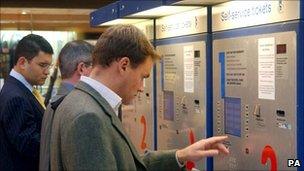First Capital Connect 46% rail fare hike criticised
- Published

Season ticket holders could be paying as much as 10.8% more
A union is urging the government to intervene after it emerged rail fares on some First Capital Connect services will rise by up to 46% next month.
Rail travellers are facing an average rail fare rise of 6.2% in the new year, according to industry figures.
Gerry Doherty, leader of the TSSA rail union, said the rise was "simply outrageous".
First Capital Connect said the majority of its fares were rising by less than the national average.
Regulated fares, which include season tickets, will go up by an average of 5.8% from January. Some of these fares could rise by as much as 10.8%.
Some unregulated fares, typically short distance off-peak ones, will rise by more than the 6.2% overall average, but the industry is not giving a figure.
There is no price cap on these so rail firms could raise them by much more.
BBC transport correspondent Richard Scott said: "Train companies are bound by competition. If they think they can increase it by 10% then they will but they don't want to drive people off the railways."
'Tough times'
The Campaign for Better Transport warned the rises would price people off trains
Passenger groups expressed disappointment that the Association of Train Operating Companies (Atoc) had not provided figures for individual train companies.
But Atoc, which supplied the figures, said the above-inflation rises were a response to recent government policy changes, which meant passengers having to pay more towards railway investment.
Michael Roberts, chief executive of Atoc, said: "We know times are tough for many people but next year's fare increases will ensure that Britain can continue investing in its railways.
"Even with these fare increases, the money passengers spend on fares covers only half the cost of running the railways - taxpayers make up the difference."
Campaign for Better Transport campaigner Alexandra Woodsworth said the rises made a mockery of the government's commitment to fair pricing for rail travel.
"Increasing rail fares is not smart, not fair and not green. It's high time that the government started keeping some of its promises," she said.
Mr Doherty said: "It is simply outrageous that hard-pressed commuters are being forced to pay fare hikes of up to 10% when they are themselves facing pay freezes and job cuts.
"Passengers will regard that as a sick joke seeing as we have the most expensive and overcrowded railway in Europe."
Regulated fares are tied to an annual price cap formula meaning fares can increase each January only by the previous July's RPI inflation rate plus 1%. This means a 5.8% average rise for 2011.
However, companies are able to put up some fares by more than 5% as long as other fares decrease at the same rate.
In January 2012, passengers will have to dig even deeper into their pockets when the annual price rise formula changes to RPI plus 3% across the network.
Our correspondent said rail travel dipped during the recession but, as the economy recovered, passenger journeys rose 10% over the past year.
Demand, he said, was expected to double over the coming decade.
'Less than average'
On Thursday, the government is expected to make an announcement about long-term rail projects.
A First Capital Connect spokesman said: "The tickets quoted are used by less than 0.3% of our customers.
"The overwhelming vast majority of customers will see fares rise by an average of 5.5% which is less than the national average of 6.2%.
"All of our fares are set at levels to encourage growth and it is not in our interest to price people off the railway."
- Published23 November 2010
- Published8 October 2010
- Published9 November 2010